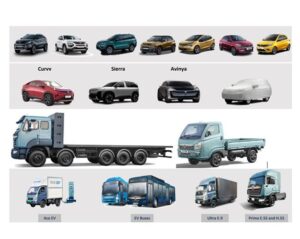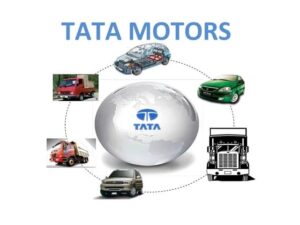Tata Motors Limited, a flagship company of the Tata Group, is a leading global automotive manufacturer headquartered in Mumbai, India. Established in 1945, the company has a rich history of innovation and expansion, with a diverse product portfolio that includes cars, trucks, vans, buses, and electric vehicles. Over the years, Tata Motors has established itself as a key player in both domestic and international markets, with subsidiaries like Jaguar Land Rover and Tata Daewoo further strengthening its global presence.
Tata Motors began its journey as a locomotive manufacturer in 1945 and later ventured into the commercial vehicle sector in collaboration with Daimler-Benz of Germany in 1954. With the launch of passenger vehicles like the Tata Sierra, Tata Estate, Tata Sumo, and Tata Safari in the 1990s, Tata Motors made significant strides in the automotive market, catering to the diverse needs of consumers.

Finance Overview:
Revenue:
Tata Motors Limited has consistently demonstrated strong financial performance, reflecting its position as a key player in the global automotive industry. The company’s revenue has experienced steady growth over the years, driven by its diverse product portfolio, strategic acquisitions, and expansion into new markets. In the fiscal year 2023, Tata Motors reported a revenue of ₹350,600.15 crore (approximately US$44 billion), showcasing its robust financial standing and market competitiveness.
| Fiscal Year | Revenue (in ₹ crore) | Revenue (in US$ billion) |
|---|---|---|
| 2023 | ₹350,600.15 | $44 |
Funding and Investments:
Tata Motors has attracted significant investments from both domestic and international sources, further bolstering its growth and innovation initiatives. Notable among these investments is the $1 billion funding received by Tata Motors’ electric vehicle subsidiary from private equity firm TPG in October 2021. This substantial investment underscores the growing demand for electric mobility solutions and Tata Motors’ commitment to sustainable transportation.
Acquisitions and Strategic Partnerships:
Tata Motors has strategically leveraged acquisitions and partnerships to expand its product offerings, technological capabilities, and global footprint. Some of the key acquisitions and joint ventures include:
- Daewoo’s Truck Manufacturing Unit: In the early 2000s, Tata Motors acquired Daewoo’s truck manufacturing unit in South Korea, strengthening its presence in the commercial vehicle segment and gaining access to advanced technology and manufacturing facilities.
- Jaguar Land Rover (JLR): One of Tata Motors’ most significant acquisitions was the purchase of Jaguar Land Rover from Ford Motor Company in June 2008. This acquisition not only propelled Tata Motors into the luxury car segment but also provided access to iconic brands, cutting-edge technology, and a global distribution network.
- Tata Marcopolo: Tata Motors formed a joint venture with Brazil-based Marcopolo S.A. to establish Tata Marcopolo, a bus-manufacturing entity aimed at developing mass rapid transportation systems. This partnership has enabled Tata Motors to enhance its presence in the commercial vehicle market and offer innovative solutions for urban mobility.
- Tata-Hitachi Construction Machinery: Tata Motors’ joint venture with Hitachi in the construction machinery sector has facilitated the development and manufacturing of excavators and other heavy equipment, catering to the infrastructure needs of diverse markets.

Operations and Manufacturing:
Tata Motors operates multiple manufacturing plants across India and internationally, producing a wide range of vehicles to meet the needs of various markets. With research and development centers in India, South Korea, the UK, and Spain, the company emphasizes technological advancement and product quality.
Tata Motors Product Portfolio:
Tata Motors offers a diverse product portfolio encompassing passenger vehicles, commercial vehicles, and electric vehicles. From the compact Tata Tiago to the rugged Tata Harrier and the innovative Tata Nexon EV, the company caters to a wide spectrum of customers, prioritizing performance, safety, and sustainability.
| Category | Model | Year of Introduction |
|---|---|---|
| Hatchback | Tata Tiago | 2016 |
| Tata Altroz | 2020 | |
| Sedan | Tata Tigor | 2016 |
| SUV/Crossover | Tata Punch | 2021 |
| Tata Nexon | 2017 | |
| Tata Harrier | 2018 | |
| Tata Safari | 2021 | |
| Electric | Tata Nexon EV | 2020 |
| Tata Tigor EV | 2021 | |
| Tata Tiago EV | 2022 | |
| Tata Punch EV | 2023 |

Electric Vehicle Initiative:
Tata Motors is at the forefront of the electric vehicle revolution, with a dedicated focus on developing sustainable mobility solutions. The launch of electric vehicles like the Nexon EV and Tigor EV underscores Tata Motors’ commitment to environmental stewardship and technological innovation.
Electric Vehicle Initiative:
Tata Motors is at the forefront of the electric vehicle revolution, with a dedicated focus on developing sustainable mobility solutions. The launch of electric vehicles like the Nexon EV and Tigor EV underscores Tata Motors’ commitment to environmental stewardship and technological innovation.
- Product Development:
- Tata Motors has introduced several electric vehicle models, including the Tata Nexon EV, Tata Tigor EV, Tata Tiago EV, and Tata Punch EV. These models offer consumers an eco-friendly alternative to traditional internal combustion engine vehicles.
- The electric vehicles feature advanced technology, including Tata Motors’ proprietary Ziptron electric powertrain technology, which enhances performance, efficiency, and range.
- Infrastructure Expansion:
- Tata Motors is actively involved in the expansion of charging infrastructure to support the growing demand for electric vehicles. The company collaborates with government agencies, private entities, and other stakeholders to establish charging stations across key locations.
- Additionally, Tata Motors offers home charging solutions for electric vehicle owners, making it convenient for them to charge their vehicles at their residences.
- Market Penetration:
- Tata Motors is focused on expanding the market penetration of electric vehicles by increasing awareness, affordability, and accessibility.
- The company engages in marketing campaigns, promotional activities, and partnerships to educate consumers about the benefits of electric vehicles and encourage adoption.
- Tata Motors also offers attractive financing options, subsidies, and incentives to make electric vehicles more affordable and accessible to a wider audience.
- Future Plans:
- Tata Motors continues to invest in research and development to further enhance its electric vehicle lineup and develop new technologies.
- The company is committed to expanding its electric vehicle portfolio and aims to introduce more electric vehicle models across various segments in the future.
- Additionally, Tata Motors is exploring opportunities to collaborate with other industry players, government agencies, and research institutions to accelerate the adoption of electric vehicles and contribute to sustainable mobility.
Recent Developments:
In March 2024, Tata Motors announced a significant restructuring plan aimed at enhancing operational efficiencies and focusing on distinct business segments. This strategic move reflects Tata Motors’ adaptability and commitment to long-term growth and sustainability.
Tata Motors’ journey from a locomotive manufacturer to a global automotive powerhouse is a testament to its resilience, innovation, and commitment to excellence. With a rich legacy of success and a forward-looking approach, Tata Motors continues to drive positive change in the automotive industry, shaping the future of mobility for generations to come.
For more such articles visit NationToday


